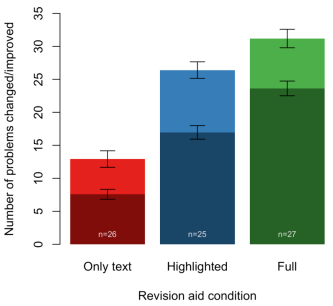How beneficial are lexicographic resources
for writing and revision environments? A pilot study
Abstract. Lexicographers and dictionary publishers have claimed for many years that the use of lexicographic resources is beneficial for resolving language-related problems. It might seem obvious that the users of writing or revision environments benefit from the integration of lexicographic resources into such systems. However, little empirical evidence has been provided so far. We present an empirical study contrasting three configurations of a writing environment: (1) plain texts (only text condition), (2) texts with highlighted language problems (highlighted condition) and (3) texts with highlighted language problems accompanied by lexicographic resources that can be used to resolve these problems (full revision aid condition). 78 native speakers of German revised two German texts excerpts containing 35 language problems. One of the text excerpts was taken from a university term paper, the other has been authored by a 12th grade high school student. The experiment was implemented using a web-based questionnaire software, which was adapted to resemble a writing environment while also keeping the setup as technologically simple as possible.
Our results suggest that participants detect more language problems, improve more of the respective text segments and introduce less semantic distortions in their revised versions if they are provided with appropriate lexicographic resources. Although participants in the ‘full revision aid’ condition took the most time to revise the texts, they did so most efficiently (operationalised by points per time). Our study has important implications for dictionary usage research, the teaching of dictionary skills and the design of writing and revision environments.
